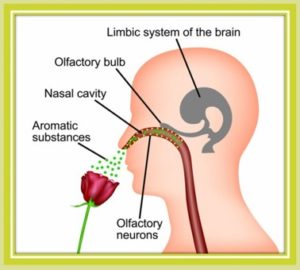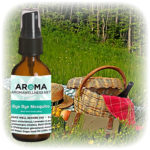Do you know……..today, when I was searching TED talk, came across, ‘The Historical Significance of Smell’ by Caro Verbeek. Yes! You guessed it right, being an Aromatherapist, I immediately opened it and was amazed to hear her talk about Neroli, Myrrh, Fran

Aromatherapy and Sense of Smell
kincense Essential Oils and the way she diffused oils for her audience.
Smell is one of the five senses (taste, sight, touch, smell, and hearing) that we all have. If one sense is not working due to an accident or illness, then other senses take over or become stronger to make up for the missing sense and give us clear picture of the things around us. Helen Adams Keller, an American author, political activist, and lecturer, who was deaf-blind said, “Smell is a potent wizard that transports us across thousands of miles and all the years we have lived.” Our nose is an important protrusion on our face that is used to smell. Our sense of smell allows us to learn, to taste, to protect and alert from danger (gas leak, spoiled or burnt food, fire), to enjoy our world. In addition to being the organ for smell, the nose also cleans the air we breathe and impacts the sound of our voice. Dogs have a more sensitive sense of smell than human.
It’s beyond the scope of this article to discuss the anatomy of nose and the physiology of olfaction. But, for our simple understanding; inside of the nose is lined with mucous membranes (secretes mucus that captures dust, germs, and other small particles that could irritate your lungs) that have millions of tiny odor receptors, connected to olfactory nerve. When odor molecules of various substances that travel through the air into our nose, these odor receptors are stimulated and send signals that travel along the olfactory nerve to the olfactory bulb. The olfactory bulb is underneath the front of your brain just above the nasal cavity. Signals are sent from the olfactory bulb to other parts of the brain to be interpreted as a smell we may recognize and identify with our environment. The sense of smell is sometimes lost for a short time when a person has a cold and we can’t taste the food during that period. Many people who have smell disorders also notice problems with their sense of taste. Problems with the sense of smell increase as people get older, and they are more common in men than women.
In 1991, laureates Richard Axel of Howard Hughes Medical Institute and Linda Buck at the Fred Hutchinson Cancer Research Center discovered about 1,000 genes that encode for olfactory receptors inside the human nose. They also found that each receptor is tuned for only a small number of odors.
Scientists regarded Limbic System of the Brain, as playing a major role in controlling our mood, memory, behaviour and emotions. Given that our sense of smell plays an important part in our psychological make-up, in Aromatherapy, we use fragrant Essential Oils with their individual specific smell and chemical (therapeutic) properties to balance and establish harmony between body-mind-soul. In modern Western health care facilities, Aromatherapy is often used as a holistic approach to conventional medicine. Different Oils are recommended to remedy different ailments and symptoms. eg:
Bergamot Essential Oil: for stress, depression, anxiety, anorexia
Eucalyptus Essential Oil: for respiratory issues, antiseptic, decongestant, Stimulant
Jasmine Essential Oil: for depression, childbirth, stress, libido
Lavender Essential Oil: is one of the most popular essential oils, Stress, sleeping, antiseptic, sedative, anti-inflammatory
Lemon Essential Oil: digestion, circulation problems, immunity booster, mood enhancer
Peppermint Essential Oil: cooling agent, sharpens focus, congestion, digestion.
Tea tree Essential Oil: immune booster, skin conditions, burns and cuts, insecticide, anti-viral, anti-bacterial
Om Healing………..Uma
(Founder of AromaWellness)
visit aromawellness.net, to order
Call 414-793-8645, to schedule your consultation appointment





Recent Comments